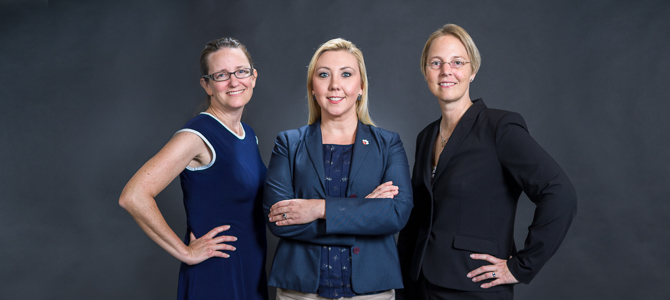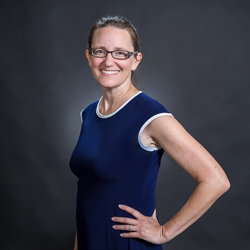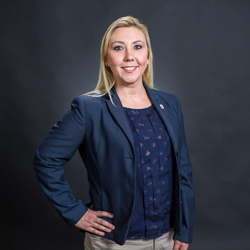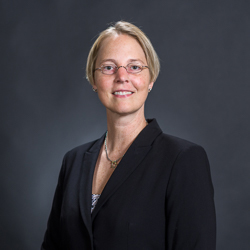
Researcher, Medical School Innovator and Health Care Administrator Find Common Goals in Encouraging Women to Pursue Medicine and Science Careers

Throughout September and October, the University of Arizona College of Medicine – Phoenix is highlighting women researchers and faculty who are teaching, mentoring and leading others in academic medicine.
The special coverage is part of Women in Medicine and Science month (September), an initiative of the American Medical Association, which is highlighting advocacy of women physicians and scientists and health issues impacting female patients. The theme is “Celebrating Our Legacy, Embracing Our Future.”
Taben M. Hale, PhD, is a nationally known researcher who is developing treatments to prevent heart failure, and carves out important time to mentor students from high school to post docs as a way to improve access to STEM careers for women. Jennifer Hartmark-Hill, MD, is already making her mark as an innovator in medical education by establishing the Program for Narrative Medicine at the UA College of Medicine – Phoenix. Michelle Dorsey, MD, is an expert in process improvement and change management. She will spend the next year as a fellow in the White House Leadership Development Program. One of her priorities is spreading the word about the vast opportunities in health care professions for women.
Learn more about these exceptional women scientists and physicians:

“In 1946 my grandmother was forced to drop out of her biochemistry graduate program when she became pregnant with my father. Thanks to the trailblazing women who came before me, I live in a time and place where I did not have to choose between having a career in science and having a family. It is incumbent upon me to continue this work to remove barriers that impede the advancement of women in science. I am excited to be part of the UA College of Medicine – Phoenix Women in Medicine and Science group, which works to promote advancement, leadership and success for women faculty in all roles within academic medicine and science.”

“We need to promote a new generation of diverse physician-leaders and innovators, including more women, into the governance of health care systems if we are going to reimagine how to improve our health as a nation,” said Dr. Hartmark-Hill. “We must invest in strong primary care community-based models that include interprofessional, integrated care for people in need.”

“The proportion of women entering radiology residencies remains quite low in comparison to the number of female medical students,” Dr. Dorsey said. “Radiology is frequently not considered to be patient facing, although that has not been my experience as a breast imager. It is a technologically advanced, ever-changing field with many opportunities for personal and professional growth. We must look for ways to bring up the next generation of women radiologists.”
If you would like more information about the Women in Medicine and Science group, please contact Julie Parrish. For information about the Phoenix chapter of Graduate Women in Science, contact Sandra Maria Hinz.
SPECIAL SEPTEMBER/October CONTENT:
Features with women in leadership at the College of Medicine – Phoenix:
- Ella Nikulina, PhD; Shalini Sharma, PhD; Theresa Currier Thomas, PhD.
- Rebecca Fisher, PhD; Amelia Gallitano, MD, PhD; Melissa Herbst-Kralovetz, PhD.
- Maria Manriquez, MD; Susan Kaib, MD, Cheryl O’Malley, MD.
- Taben Hale, PhD; Jennifer Hartmark-Hill, MD, Michelle Dorsey, MD.
- Suwon Kim, PhD; Karen Hastings, MD, PhD; Aparna Sertil, PhD.
About the College
Founded in 2007, the University of Arizona College of Medicine – Phoenix inspires and trains exemplary physicians, scientists and leaders to advance its core missions in education, research, clinical care and service to communities across Arizona. The college’s strength lies in our collaborations and partnerships with clinical affiliates, community organizations and industry sponsors. With our primary affiliate, Banner Health, we are recognized as the premier academic medical center in Phoenix. As an anchor institution of the Phoenix Bioscience Core, the college is home to signature research programs in neurosciences, cardiopulmonary diseases, immunology, informatics and metabolism. These focus areas uniquely position us to drive biomedical research and bolster economic development in the region.
As an urban institution with strong roots in rural and tribal health, the college has graduated more than 1,000 physicians and matriculates 130 students each year. Greater than 60% of matriculating students are from Arizona and many continue training at our GME sponsored residency programs, ultimately pursuing local academic and community-based opportunities. While our traditional four-year program continues to thrive, we will launch our recently approved accelerated three-year medical student curriculum with exclusive focus on primary care. This program is designed to further enhance workforce retention needs across Arizona.
The college has embarked on our strategic plan for 2025 to 2030. Learn more.